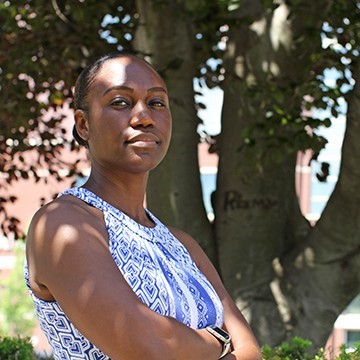For a more inclusive healthcare future
Taken from AFT Voices
By Alice Barden, President, HPAE local 5004
February 24, 2022
 In 2021, my union, the Health Professionals and Allied Employees in New Jersey, took an important step when we passed a resolution at our convention resolving to put the full weight of our union behind efforts to address racial disparities in healthcare.
In 2021, my union, the Health Professionals and Allied Employees in New Jersey, took an important step when we passed a resolution at our convention resolving to put the full weight of our union behind efforts to address racial disparities in healthcare.
We have always known that racial and ethnic minorities face implicit bias and disparities in access to healthcare, the quality of care received, and have higher adverse outcomes rates. But it was still gut-wrenching to see those inequities play out so starkly during the coronavirus pandemic. During the first year of the pandemic in 2020, coronavirus was the leading cause of death for Black, Hispanic, Asian and foreign-born residents in New Jersey.
Our challenges as healthcare professionals include recognizing our own limitations and biases and living up to the highest ideals of our calling, which is to save lives and care for people often at their most vulnerable.
The pandemic will end one day, but the strictures in our society and our culture — implicit and explicit biases born out of racism and poverty — will always be with us. How do we rise above them?
By learning and seeing what the numbers are telling us.
We know, for instance, that New Jersey is ranked 47th in the nation for maternal deaths and has one of the widest racial disparities for maternal and infant mortality. A Black mother in my state is seven times more likely than a white mother to die from maternity-related complications, and a Black baby is over three times more likely than a white baby to die before their first birthday.
As a longtime maternity care nurse, I know pregnancy and giving birth are among life’s most affirming and fulfilling events as well as one of the most physically challenging and harrowing experiences women go through. A person’s race or ethnicity should not exacerbate those challenges, but we have always known it does. We hope to stamp out the differential experiences women of color have giving birth through this initiative. We recognize this will be challenging.
For instance, better education in our fields on implicit bias when white healthcare workers treat people of color, especially around maternal health.
We need to continue to fight for more investment to expand healthcare coverage, especially in communities of color, and fight to improve the quality of care for all patients, no matter the color of their skin or their ethnic and/or racial background. One of the ways we can do that is by addressing chronic staffing shortages in healthcare, a huge issue that the pandemic has exacerbated.
Across the United States, data shows that racial and ethnic minority groups experience higher rates of illness and death across a wide range of health conditions, including diabetes, hypertension, obesity, asthma and heart disease.
We know these disparities reflect the social, environmental and structural effects of racism and social determinants’ impact on health.
These social determinants include poverty, unemployment, homelessness, food insecurity, access to healthcare and lack of health insurance, all of which create barriers to optimal patient outcomes and subsequently increase morbidity and mortality.
As we are working as a union, we will assist our employers, for instance, in implementing programs that they devise to address health disparity issues.
Englewood Health, which runs the Englewood Hospital and Medical Center where I work, created a Diversity and Inclusion Education Council to implement and foster practices that support and accelerate diversity and inclusion, with a specific focus on addressing healthcare disparities and diversity in the workplace.
It is an important step for this vital institution, not only in Englewood but across our state and neighboring states, because we draw our patients from all over. Englewood Hospital is where HPAE began, so we will work with this employer to help shape that initiative to help all our patients achieve better outcomes.
Our efforts will not stop with our employers.
As we have always done across a broad range of issues, HPAE will continue to support legislation and programs that identify and try to reduce racial disparities in healthcare and address social determinants of healthcare, healthcare inequities and racial bias through statewide training, membership meetings, labor-management meetings, committee meetings and other member-engagement strategies.
